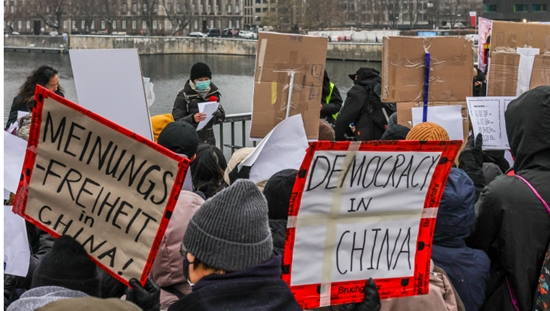
Amnesty International says: “Overseas students face harassment and surveillance in campaign of transnational repression.” They do.
Nikkei Asia says: “Beijing’s transnational repression reaches overseas Chinese students: report.”
Such harassment is a growing concern for Chinese students abroad. At universities in the U.S. and Europe, regions where freedom of speech and assembly are respected, they now hesitate to express political views because of the possible repercussions back in China, human rights group Amnesty International said in a 63-page report published Monday in London, where the organization is headquartered.
“This fear has a profound ‘chilling effect’ on student participation in academic life and work, compelling students to censor themselves in academic discussions, avoid perceived ‘sensitive’ topics — as viewed by Chinese authorities — in their studies, and decline careers in academia,” the report noted. “The fear of being reported to Chinese or Hong Kong authorities also curbs students’ willingness to discuss certain issues even in social settings or online, or attend some public events, or join certain clubs on campus.”
The group interviewed a total of 32 Chinese students and recent graduates in Western countries between June 2023 and this past April. Twenty-two of them “said the fear of the Chinese government’s repressive efforts had limited or negatively influenced their participation in academic life while studying overseas,” according to the report.
Chinese Foreign Ministry spokesperson Wang Wenbin on Monday denied the allegations in the Amnesty report, describing them as “sheer smear and vilification.”
“Any objective media outlet will find that the vast majority of Chinese nationals overseas are proud of the development achievements of their home country,” he said at a daily news conference in Beijing.
Wang’s words are an exercise in deflection, a standard method of Chinese Communist Party propaganda. It may be true that a great many Chinese nationals overseas are “proud of the development achievements of their home country,” whatever this means; and the CCP has its legions of partisans who may play up its purported role in “development achievements” while rationalizing or downplaying its oppression and murders. But if so, it doesn’t go to show that China is innocent of perpetrating the transnational repression attested to by the Chinese nationals studying abroad who spoke to Amnesty International.
Deutsche Welle says: “Amnesty: Repression against Chinese students abroad grows.” Here we have a headline attributing a slightly different conclusion. Maybe DW knows that China represses Chinese nationals studying abroad the way it knows about other established facts, but DW is agnostic about whether this repression is increasing or accepts this conclusion only provisionally.
Agence France-Presse says: “China Accused Of Targeting Overseas Citizens For Political Activism.”
Financial Times says: “China accused of ‘transnational repression’ of students.”
These two headlines focus on the accusation, not the fact of China’s transnational repression. However, in the article itself, the Financial Times writer refers to what Amnesty International has “found” about China’s actions, rather than what it is accusing China of doing.
Chinese students studying in Europe and the US are being subjected to harassment and intimidation by Beijing authorities, leading to self-censorship and anxiety, a report by Amnesty International has found.
The human rights advocacy group said its findings, based on student testimonies, raised serious questions for university leaders and governments about how to protect Chinese students from what it termed “transnational repression”.
The term “transnational repression” is not new, not an innovation of this report. The writer of the Times Higher Education headline has more warrant for directly quoting a phrase: “Chinese students face ‘sinister pattern’ of surveillance overseas.” Also, though the Amnesty International report is being referred to in this Times Higher Education headline, this headline conveys not that Amnesty International is “accusing” China but that China is in fact responsible for a sinister pattern of overseas surveillance.
Climate of fear
Amnesty International’s report says: “ ’On my campus, I am afraid’: China’s targeting of overseas students stifles rights” (May 13, 2024).
Chinese and Hong Kong students studying abroad are living in fear of intimidation, harassment and surveillance as Chinese authorities seek to prevent them engaging with “sensitive” or political issues. This climate of fear on campuses in Europe and North America is the result of Chinese authorities’ transnational repression against overseas students, in violation of their human rights….
Virtually all students interviewed said they self-censored to some degree in their expression, both online and offline, and in their activities—in some cases extensively—fearing repercussions from Chinese authorities….
A third of students interviewed said the climate of fear made them change the focus of their studies. Students who might otherwise have considered pursuing advanced research or academic careers in the study of human rights or politics have ended up forgoing these options due to the fear of unwanted repercussions or the anticipation of significant hurdles imposed by Chinese authorities, choosing instead to explore other issues or to leave academia entirely.
Amnesty International accuses Chinese authorities of seeking to prevent Chinese nationals who are studying overseas from “engaging with ‘sensitive’ or political issues.” The accusation is justified.





